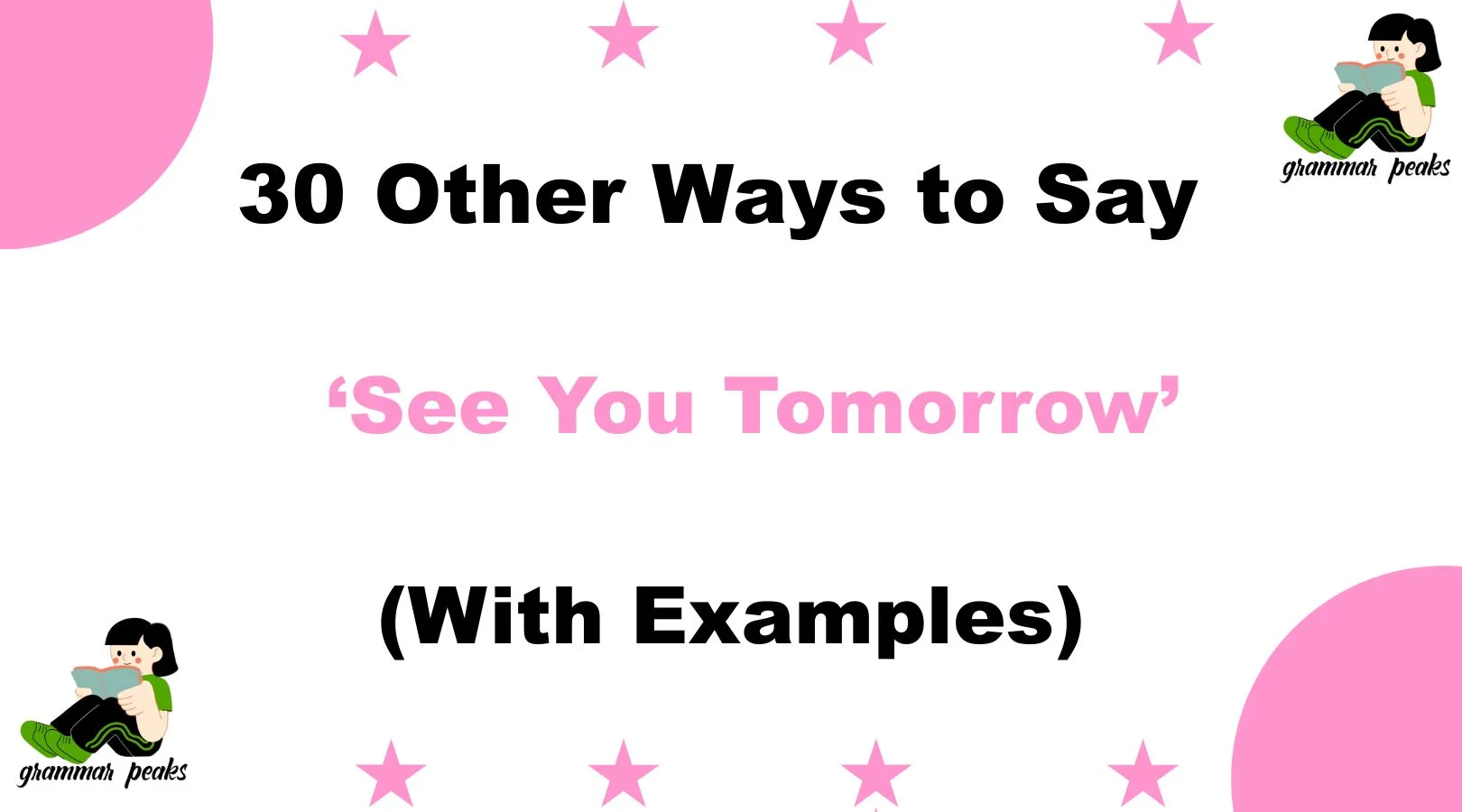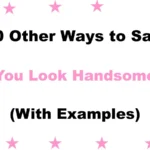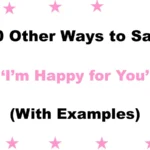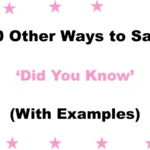Every goodbye holds a bit of meaning—especially when it’s more than just parting words. While “See you tomorrow” is perfectly polite, sometimes it lacks the warmth or creativity you want to express. Whether you’re chatting with coworkers, friends, or loved ones, using a different phrase can add a touch of personality or emotional depth.
In this article, you’ll discover 30 meaningful alternatives that will help you say goodbye in a way that feels genuine, kind, and memorable. These options can bring more connection to your daily communication—without sounding routine or robotic.
What Does “See You Tomorrow” Mean?
“See you tomorrow” is a common farewell used to indicate that you plan to reconnect with someone the next day. It suggests continuity and familiarity—whether you’re ending a conversation in person, over the phone, or via text. It carries a friendly and forward-looking tone, signalling that today’s connection will continue tomorrow.
When to Use “See You Tomorrow”
You can use “See you tomorrow” whenever you have plans—formal or informal—to see, talk to, or meet someone the next day. It fits a range of situations: workplace conversations, casual goodbyes, family check-ins, or end-of-day routines. It’s polite, safe, and positive.
Is It Professional/Polite to Say “See You Tomorrow”?
Yes, “See you tomorrow” is considered both professional and polite. It works well in most business or casual contexts, especially when expectations are already set for the next meeting. However, if you’re in a very formal setting, you might choose a more refined variation depending on tone.
Pros and Cons of Saying “See You Tomorrow”
Pros:
- Simple and easy to understand
- Friendly and optimistic
- Suitable for most conversations
Cons:
- May feel generic or repetitive
- Less expressive than alternatives
- Not always ideal for formal written communication
Synonyms for “See You Tomorrow”
- Catch you tomorrow
- Talk to you tomorrow
- See you bright and early
- Until tomorrow
- I’ll see you in the morning
- See you later — tomorrow
- Till tomorrow
- See you on the flip side (tomorrow)
- Until we meet again tomorrow
- Same time tomorrow?
- Can’t wait for tomorrow
- Looking forward to tomorrow
- See you at sunrise
- We’ll connect tomorrow
- Talk soon — tomorrow
- Tomorrow, then!
- Tomorrow it is
- Morning meet-up?
- Until our next chat
- Bright and early, then
- See you after some sleep
- See you post-coffee
- Reconnect tomorrow
- Talk again tomorrow
- Meet again tomorrow
- See you in 24
- Until then
- Tomorrow’s another day together
- We’ll pick this up tomorrow
- Tomorrow’s waiting for us
1. Catch you tomorrow
Definition: An easygoing and relaxed way to say you’ll see someone the next day.
Detailed Explanation: This phrase is casual and often used among friends or coworkers, adding a personal and upbeat tone.
Scenario Example: “Got everything wrapped up—catch you tomorrow!”
Best Use: Informal chats, workplace conversations.
Worst Use: Very formal or written contexts.
Tone: Casual, light, friendly
2. Talk to you tomorrow
Definition: Indicates ongoing conversation rather than in-person interaction.
Detailed Explanation: Great for remote work or digital communication where speaking again is more likely than meeting.
Scenario Example: “Thanks for your help today—talk to you tomorrow.”
Best Use: Messages, phone calls, work communication.
Worst Use: Situations where in-person meeting is expected.
Tone: Warm, communicative, kind
3. See you bright and early
Definition: Adds a cheerful touch to an early morning goodbye.
Detailed Explanation: Shows positivity and energy toward the coming day, especially when a morning start is planned.
Scenario Example: “We’ve got an early meeting—see you bright and early!”
Best Use: Scheduled morning plans, workplace settings.
Worst Use: When there’s no clear meeting time.
Tone: Energetic, optimistic, friendly
4. Until tomorrow
Definition: A soft, semi-formal farewell pointing to tomorrow.
Detailed Explanation: Often used to close written or heartfelt conversations with grace and warmth.
Scenario Example: “Good night, until tomorrow.”
Best Use: Texts, cards, or reflective messages.
Worst Use: Casual or rushed chats.
Tone: Thoughtful, respectful, gentle
5. I’ll see you in the morning
Definition: Indicates a planned face-to-face interaction in the morning.
Detailed Explanation: This phrase reassures the listener that they are on your mind for the next day.
Scenario Example: “All set for the trip—I’ll see you in the morning.”
Best Use: Morning plans, pre-scheduled meetings.
Worst Use: Vague or unscheduled farewells.
Tone: Caring, direct, reassuring
6. See you later — tomorrow
Definition: A hybrid farewell that blends casual and forward-looking language.
Detailed Explanation: Combines the relaxed “see you later” with the clarity of “tomorrow,” making it fun but specific.
Scenario Example: “Great working with you today—see you later, tomorrow!”
Best Use: Friendly work chats, informal meetings.
Worst Use: Strictly formal environments.
Tone: Casual, cheerful, familiar
7. Till tomorrow
Definition: A simple, slightly poetic version of “see you tomorrow.”
Detailed Explanation: Often used in written or poetic language. It carries a subtle emotional depth.
Scenario Example: “It’s been lovely—till tomorrow.”
Best Use: Emails, romantic or thoughtful conversations.
Worst Use: Fast-paced or business-only contexts.
Tone: Warm, thoughtful, classic
8. See you on the flip side (tomorrow)
Definition: A playful phrase implying “next time” or “soon.”
Detailed Explanation: Adding “tomorrow” ensures clarity while keeping the tone fun.
Scenario Example: “This day flew by—see you on the flip side, tomorrow!”
Best Use: Friends, team banter, creative workplaces.
Worst Use: Formal documents or emails.
Tone: Humorous, upbeat, quirky
9. Until we meet again tomorrow
Definition: A poetic and caring way to express departure.
Detailed Explanation: Suggests warmth and anticipation for the next meeting, especially in emotional or tender moments.
Scenario Example: “Our time always flies—until we meet again tomorrow.”
Best Use: Personal notes, romantic conversations.
Worst Use: Fast, casual exchanges.
Tone: Sentimental, emotional, poetic
10. Same time tomorrow?
Definition: A question that assumes a routine or agreement for the next meeting.
Detailed Explanation: Suggests comfort with a schedule, reinforcing consistency.
Scenario Example: “That was productive—same time tomorrow?”
Best Use: Team projects, appointments.
Worst Use: Situations lacking prior commitment.
Tone: Practical, efficient, friendly
11. Can’t wait for tomorrow
Definition: Adds excitement and anticipation to a standard goodbye.
Detailed Explanation: Emphasizes eagerness, making the interaction feel special or important.
Scenario Example: “That was awesome—can’t wait for tomorrow!”
Best Use: Close friendships, upcoming events.
Worst Use: Reserved or minimal contexts.
Tone: Excited, enthusiastic, emotional
12. Looking forward to tomorrow
Definition: A more polite and composed expression of excitement.
Detailed Explanation: Suggests emotional investment or preparation for what’s to come.
Scenario Example: “Today was great—looking forward to tomorrow.”
Best Use: Work, school, family conversations.
Worst Use: Extremely formal writing.
Tone: Hopeful, polite, optimistic
13. See you at sunrise
Definition: A poetic way to refer to the next morning.
Detailed Explanation: Adds imagery and charm to a farewell, especially for early risers.
Scenario Example: “We’ll start early—see you at sunrise.”
Best Use: Morning plans, outdoor or creative events.
Worst Use: Literal night meetings.
Tone: Poetic, imaginative, warm
14. We’ll connect tomorrow
Definition: Implies a meaningful conversation or meeting is coming.
Detailed Explanation: Especially relevant for remote work, virtual chats, or long-distance relationships.
Scenario Example: “Let’s pause here—we’ll connect tomorrow.”
Best Use: Emails, project work, virtual meetings.
Worst Use: Very casual conversations.
Tone: Professional, calm, considerate
15. Talk soon — tomorrow
Definition: A gentle nudge that you’ll resume the talk the next day.
Detailed Explanation: Combines “talk soon” with a definite time, making it both warm and specific.
Scenario Example: “I’ll leave you to rest—talk soon, tomorrow.”
Best Use: Friends, coworkers, client check-ins.
Worst Use: Random acquaintances.
Tone: Friendly, open, gentle
16. Tomorrow, then!
Definition: A confident way to wrap up with clarity and agreement.
Detailed Explanation: Feels like confirming an appointment or shared plan.
Scenario Example: “Everything’s set—tomorrow, then!”
Best Use: Meetings, deadlines, school plans.
Worst Use: Cold or distant relationships.
Tone: Decisive, upbeat, agreeable
17. Tomorrow it is
Definition: Reaffirms the schedule without sounding robotic.
Detailed Explanation: Indicates agreement or conclusion of planning for the next meeting.
Scenario Example: “If that’s best for everyone—tomorrow it is.”
Best Use: Work, scheduling, plans.
Worst Use: Overly casual settings.
Tone: Professional, clear, confirming
18. Morning meet-up?
Definition: A light, suggestive way to plan a get-together.
Detailed Explanation: Works well for informal or friendly reminders, often text-based.
Scenario Example: “Morning meet-up? Usual time?”
Best Use: Social gatherings, coworking spaces.
Worst Use: Strict business formats.
Tone: Playful, casual, spontaneous
19. Until our next chat
Definition: Adds charm while focusing on the communication itself.
Detailed Explanation: Suggests appreciation for conversation, and a wish to continue.
Scenario Example: “That was lovely—until our next chat!”
Best Use: Heartfelt, emotional connections.
Worst Use: Dry, administrative conversations.
Tone: Warm, expressive, soft
20. Bright and early, then
Definition: Reinforces an early plan with enthusiasm.
Detailed Explanation: Works well for people with routines or morning events.
Scenario Example: “Alarm’s set—bright and early, then!”
Best Use: Group plans, events, team projects.
Worst Use: If the time isn’t early!
Tone: Cheerful, confident, enthusiastic
21. See you after some sleep
Definition: A lighthearted way to acknowledge rest before the next meeting.
Detailed Explanation: Adds personality, especially in evening chats.
Scenario Example: “I’m tired—see you after some sleep.”
Best Use: Texts, close friends, late-night conversations.
Worst Use: Formal writing.
Tone: Funny, relaxed, personal
22. See you post-coffee
Definition: A fun, coffee-lover’s way of saying “tomorrow.”
Detailed Explanation: Makes your message relatable and informal.
Scenario Example: “Tomorrow’s a big one—see you post-coffee.”
Best Use: Coffee culture, coworkers, team banter.
Worst Use: Non-casual or sober settings.
Tone: Witty, friendly, relaxed
23. Reconnect tomorrow
Definition: Focuses on continuity and staying in touch.
Detailed Explanation: Especially suitable for ongoing work or supportive relationships.
Scenario Example: “This was great—we’ll reconnect tomorrow.”
Best Use: Work chats, therapy, client follow-ups.
Worst Use: Distant, unfamiliar contacts.
Tone: Supportive, warm, ongoing
24. Talk again tomorrow
Definition: Suggests conversational follow-up in a simple way.
Detailed Explanation: Feels familiar and friendly, especially for chat-based relationships.
Scenario Example: “Sleep tight—we’ll talk again tomorrow.”
Best Use: Messaging, friends, support systems.
Worst Use: Business memos.
Tone: Caring, soft, informal
25. Meet again tomorrow
Definition: Refers to seeing someone again soon in a neutral way.
Detailed Explanation: Works across formal and informal contexts depending on delivery.
Scenario Example: “We’ll meet again tomorrow to review the draft.”
Best Use: Meetings, tutoring, classes.
Worst Use: Emotionally distant departures.
Tone: Balanced, polite, dependable
26. See you in 24
Definition: A quirky, time-based way of saying “see you tomorrow.”
Detailed Explanation: Makes you sound tech-savvy or clever without sounding stiff.
Scenario Example: “Good session—see you in 24.”
Best Use: Creative teams, gamers, digital culture.
Worst Use: Traditional or older audiences.
Tone: Modern, clever, playful
27. Until then
Definition: Refers to a known, upcoming meeting in a smooth, neutral way.
Detailed Explanation: Leaves room for formality or familiarity, depending on tone.
Scenario Example: “Got it—until then.”
Best Use: Formal texts, team meetings.
Worst Use: Random chats without a future date.
Tone: Mild, professional, thoughtful
28. Tomorrow’s another day together
Definition: Adds emotional connection and forward-looking warmth.
Detailed Explanation: Suggests the bond will continue, perfect for romantic or supportive conversations.
Scenario Example: “Today was amazing—tomorrow’s another day together.”
Best Use: Loved ones, close friendships.
Worst Use: Workplace dialogue.
Tone: Heartfelt, sweet, hopeful
29. We’ll pick this up tomorrow
Definition: Indicates a task or conversation will resume soon.
Detailed Explanation: Common in work and school environments, it creates continuity.
Scenario Example: “We’re out of time—we’ll pick this up tomorrow.”
Best Use: Projects, lessons, collaborative settings.
Worst Use: Farewells with no clear follow-up.
Tone: Professional, organized, calm
30. Tomorrow’s waiting for us
Definition: A poetic and hopeful phrase that adds inspiration to a farewell.
Detailed Explanation: Suggests that tomorrow brings promise, togetherness, or purpose.
Scenario Example: “Rest easy—tomorrow’s waiting for us.”
Best Use: Emotional closings, loved ones, deep chats.
Worst Use: Dry, logistical discussions.
Tone: Inspirational, gentle, thoughtful
Conclusion
Saying “See you tomorrow” is more than a habit—it’s a connection. But as you’ve now seen, there are many beautiful, personal, and expressive ways to send someone off until the next day. Whether you’re writing a message, saying goodbye in person, or signing off a call, choosing the right phrasing adds sincerity, warmth, and intention to your words. Use these 30 thoughtful alternatives to reflect your relationship, your tone, and the moment—and make even the simplest goodbye feel meaningful.
FAQs
1. What is the most polite way to say “See you tomorrow”?
When you’re aiming for a polite and respectful tone, especially in a professional or formal context, it’s best to choose alternatives that carry a sense of courtesy. Phrases like “Looking forward to tomorrow,” “Talk to you again tomorrow,” or “Until tomorrow” are excellent choices.
2. Can I use a fun or casual version of “See you tomorrow” in texts or chats?
Absolutely! If you’re messaging a friend, coworker, or someone you share a relaxed relationship with, feel free to keep it light and friendly. Sayings like “Catch you tomorrow!” “See ya tomorrow!” or “Tomorrow, same time, same place?” bring in a cheerful and informal vibe.
3. Is “See you tomorrow” appropriate for emails?
Yes, “See you tomorrow” works fine in emails, especially informal ones. However, in more professional or structured email settings, it’s a good idea to upgrade the phrasing slightly. Try using “I look forward to speaking with you tomorrow” or “We’ll reconnect tomorrow.”
4. How can I make “See you tomorrow” sound more meaningful or emotional?
If you want to add a touch of emotion or affection to your message, especially when talking to loved ones or close friends, there are several heartfelt ways to express it. Alternatives like “Until we meet again tomorrow,” “Can’t wait to see you tomorrow,” or “Tomorrow’s already better knowing I’ll see you” offer comfort, warmth, and care
5. What’s the best way to choose the right alternative to “See you tomorrow”?
The key to choosing the right alternative is to consider the tone and the relationship with the person you’re speaking to. If you’re communicating in a professional setting, go for respectful and clear options like “Speak with you tomorrow” or “Talk again tomorrow.”






